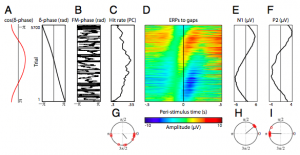In this study (available online)
Frequency-specific adaptation in human auditory cortex depends on the spectral variance in the acoustic stimulation
we show that adaptation of neural responses in human auditory cortex to acoustic stimulation is not fixed. Instead, the degree of co-adaptation in these tonotopically organized brain regions varies (widens/tightens) with the spectral properties of the acoustic stimulation. We relate this to sensory memory processes and short-term plasticity which allows for the neural system to adjust to the acoustic properties in the environment.
References
- Herrmann B, Henry MJ, Obleser J. Frequency-specific adaptation in human auditory cortex depends on the spectral variance in the acoustic stimulation. J Neurophysiol. 2013 Apr;109(8):2086–96. PMID: 23343904. [Open with Read]

